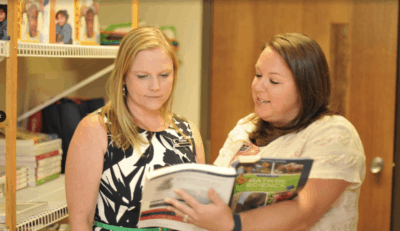
At the beginning of this year, Fren’Tres McGhee, an early childhood teacher and student at Central Piedmont Community College, was already balancing school with full-time work, like many early childhood teachers across the state. Then came COVID-19.
The transition to remote learning proved difficult in work and school. The child care center where McGhee works shut its doors in March, but teachers were still expected to post videos and conduct virtual check-ins with students. Then her pay stopped in mid-May. Her five community college courses moved online as well, some of which usually center on hands-on learning.
“It’s been pretty tough, but STRIVE has helped out a lot,” McGhee said.
STRIVE is a scholarship program at the community college that began this year and pays for the tuition, books, and fees of students in early childhood education. McGhee’s final year — which has been the hardest in terms of course load and distance learning — is covered by the program. She will graduate in the fall with an associate degree in early childhood education.
“That process took four years to get here, and it was mainly financial problems,” she said. “That’s why I’m really grateful for the STRIVE scholarship.”
Early childhood departments at community colleges are working to strengthen their programs and support students during a challenging time — and hoping the pandemic provides a unique opportunity to elevate the profession.
“We couldn’t have doctors or nurses on duty if we didn’t have child care. I’m hoping that memory will linger with folks a little while,” said Mary-Margaret Kantor, director of the early childhood program at Central Piedmont. In April, PNC Foundation gave the college’s early childhood department $500,000 to help train more pre-K teachers and to recruit high schoolers into the field.
“As our communities face the serious health and economic challenges presented by the current crisis, it’s important to acknowledge that pre-K education is essential to helping today’s children and tomorrow’s workforce achieve economic mobility,” said Weston Andress, PNC regional president for Western Carolina, in a press release.
Sign up for Early Bird, our newsletter on all things early childhood.
In May, James Sprunt Community College advertised its online early childhood worker certificate program “that will allow more individuals to enter this line of work during this time of uncertainty.”
Kris’T Sloan, an early childhood instructor at James Sprunt, said it’s hoped that offering the certificate program online will make the courses more accessible to students who are often single parents themselves and those who are working full-time in centers that have remained open throughout the pandemic.
Sloan said most of her students have continued to work in centers, first caring for children of essential workers and now for children of any workers — despite great health risks.
Duplin County, where James Sprunt is located, has the highest COVID-19 infection rate of any county in the state, with 206 cases per 10,000 residents as of Monday, June 15, according to the state Department of Health and Human Services dashboard. Sloan said many of her students have been caring for workers who are at high risk of exposure in plants.
“Plus the pay’s not that high, you don’t have benefits,” Sloan said. “That’s a big risk for anybody.”
North Carolina classified child care workers as essential while shutting down K-12 schools, allowing centers to continue to offer care throughout stay-at-home orders and qualifying child care teachers to receive certain protective equipment and supplies through federal CARES Act funding. A statewide hotline was set up for essential workers looking for child care for infants to 12-year-olds. DHHS established bonus pay for child care center employees in April and May.
But the fight to highlight the essential nature of early care and education is not new. McGhee is accustomed to hearing phrases like “babysitting” and “daycare” — signs of society’s overall disrespect of the work, she said.
“We are helping the children develop the skills that they need in order to proceed in life — and that kind of gets overlooked a lot,” said McGhee, who has worked with 2- and 3-year-olds for the past five years.
Related reading



Low compensation, low benefits, and low minimum education requirements are even more tangible signs. In North Carolina, the median hourly wage for child care workers is $10.35, according to May 2019 figures from the Bureau of Labor Statistics. A 2015 Child Care Services Association study of the workforce found that one in five early childhood teachers did not have health benefits.
Kantor said the minimum education requirement in North Carolina — one community college course — is “the bane of our existence.”
“This is a statewide feeling at all of the early childhood programs across the 58 community colleges,” Kantor said. “We all feel that at minimum a lead teacher should have a certificate, which is 12-15 credits. … They’re the foundational courses you’d expect [for] someone who is going to care for groups of children across time, across years, with that child’s development at stake.”
A state bill failed last year that would have raised this requirement. At the national level, a report released in March by the National Association for the Education of Young Children (NAEYC) — the Unifying Framework for the Early Childhood Profession — outlines recommended standards, educational pathways, and compensation for early educators at different levels of mastery.
“Even though it’s not law or rule, we push very hard for the folks who do care for children and educate them to have quality education themselves,” Kantor said.
Kantor said the 2014 Harvard University study that ranked Charlotte last in economic mobility among the country’s 50 largest cities — as well as the following push for early childhood education as part of city leaders’ response — has drawn support for her department. The STRIVE program was funded by Mecklenburg County funding directed at the community college to educate more local pre-K teachers to fill classrooms of Meck Pre-K, a locally funded pre-K program that aims to be available to all by 2024.
Kantor said she has been encouraged by this momentum, but often reminds local leaders that only one year of a high-quality environment before kindergarten is not enough for many children.
“I hope the enthusiasm will still be there and we will be able to push the issue of quality care all the way down to birth,” she said.
McGhee said two people have encouraged her to finish her degree despite obstacles — a fellow early childhood teacher and Kantor. After she graduates, she plans to go back to school and earn her bachelor’s degree, with the goal of being a kindergarten teacher.
She said pay is part of that equation. In North Carolina, early educator salaries and education requirements depend on the setting in which you’re teaching and the star rating of the center. Elementary school teachers are generally paid more than early childhood teachers. Yet McGhee said she wants folks to know, it’s the very earliest years, and the workforce behind those years, that matter most.
“Everything they learn from birth to 4 … it’s experiences that move them forward for the rest of their life,” she said.
Recommended reading



